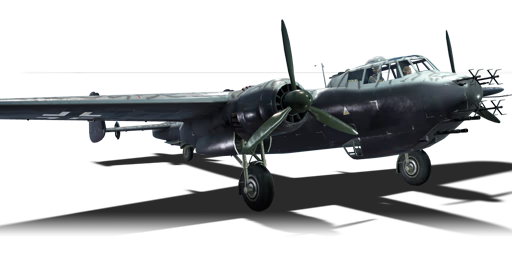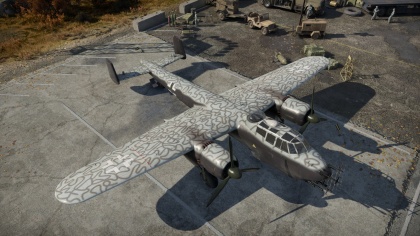Difference between revisions of "Do 217 J-2"
(→Media: Corrected syntax) |
(→Usage in battles: Corrected header) |
||
| Line 168: | Line 168: | ||
* 1 x 13 mm MG 131 machine gun, ventral turret (1,000 RPG) | * 1 x 13 mm MG 131 machine gun, ventral turret (1,000 RPG) | ||
| − | == Usage in | + | == Usage in battles == |
''Describe the tactics of playing in an aircraft, the features of using vehicles in a team and advice on tactics. Refrain from creating a "guide" - do not impose a single point of view but give the reader food for thought. Examine the most dangerous enemies and give recommendations on fighting them. If necessary, note the specifics of the game in different modes (AB, RB, SB).'' | ''Describe the tactics of playing in an aircraft, the features of using vehicles in a team and advice on tactics. Refrain from creating a "guide" - do not impose a single point of view but give the reader food for thought. Examine the most dangerous enemies and give recommendations on fighting them. If necessary, note the specifics of the game in different modes (AB, RB, SB).'' | ||
Revision as of 13:45, 1 September 2020
Contents
| This page is about the German twin-engine fighter Do 217 J-2. For other uses, see Do 217 (Family). |
Description
The Do 217 J-2 is a rank German twin-engine fighter
with a battle rating of (AB), (RB), and (SB). This aircraft was introduced into the game in Update 1.29.
General info
Flight Performance
Describe how the aircraft behaves in the air. Speed, manoeuvrability, acceleration and allowable loads - these are the most important characteristics of the vehicle.
| Characteristics | |||||||
|---|---|---|---|---|---|---|---|
| Stock | |||||||
| Max Speed (km/h at 5,500 m) |
Max altitude (meters) |
Turn time (seconds) |
Rate of climb (meters/second) |
Take-off run (meters) | |||
| AB | RB | AB | RB | AB | RB | ||
| 450 | 434 | 34.4 | 36.1 | 4.2 | 4.0 | 750 | |
| Upgraded | |||||||
| Max Speed (km/h at 5,500 m) |
Max altitude (meters) | Turn time (seconds) | Rate of climb (meters/second) |
Take-off run (meters) | |||
| AB | RB | AB | RB | AB | RB | ||
| 486 | 469 | 31.7 | 33.0 | 8.0 | 5.9 | 750 | |
Details
| Features | ||||
|---|---|---|---|---|
| Combat flap | Take-off flap | Landing flap | Air brakes | Arrestor gear |
| ✓ | ✓ | ✓ | X | X |
| Limits | ||||
|---|---|---|---|---|
| Wing-break speed (km/h) |
Gear limit (km/h) |
Combat flap (km/h) |
Max Static G | |
| + | - | |||
| 370 | ~3 | ~3 | ||
| Optimal velocities | |||
|---|---|---|---|
| Ailerons (km/h) |
Rudder (km/h) |
Elevators (km/h) |
Radiator (km/h) |
| < 290 | < 360 | < 360 | > 250 |
| Compressor (RB/SB) | ||
|---|---|---|
| Setting 1 | ||
| Optimal altitude | 100% Engine power | WEP Engine power |
| 1,000 m | 2,920 hp | 3,046 hp |
| Setting 2 | ||
| Optimal altitude | 100% Engine power | WEP Engine power |
| 4,500 m | 2,600 hp | 2,712 hp |
Survivability and armour
- 8.5 mm Steel - Fore-cockpit plate
- 8.5 mm Steel - Pilot's seat
- 50 mm Bulletproof Glass
- 8.5 mm Steel - Dorsal gunner's plate
- 5 mm Steel - Belly gunner's plate
- 8.5 mm Steel - Belly gunner's upper plate
- 5 mm Steel - Rear boom plate
- 5 mm Steel - Aft plate
Armaments
Offensive armament
The Do 217 J-2 is armed with:
- 4 x 20 mm MG FF/M cannons, chin-mounted (200 rpg = 800 total)
- 4 x 7.92 mm MG 17 machine guns, nose-mounted (700 rpg = 2,800 total)
Defensive armament
The Do 217 J-2 is defended by:
- 1 x 13 mm MG 131 machine gun, dorsal turret (500 RPG)
- 1 x 13 mm MG 131 machine gun, ventral turret (1,000 RPG)
Usage in battles
Describe the tactics of playing in an aircraft, the features of using vehicles in a team and advice on tactics. Refrain from creating a "guide" - do not impose a single point of view but give the reader food for thought. Examine the most dangerous enemies and give recommendations on fighting them. If necessary, note the specifics of the game in different modes (AB, RB, SB).
Radars
The Do 217 J-2 is equipped with a FuG 202 search radar, located in the nose of the aircraft; a control box which is part of the radar damage model is located behind the pilot.
| FuG 202 - Target Detection Radar | |||
|---|---|---|---|
| Maximum Detection Range |
Guaranteed Detection Range |
Max Azimuth Scan Angle |
Max Elevation Scan Angle |
| 4,000 m | 4,000 m | ±30° | ±30° |
Manual Engine Control
| MEC elements | ||||||
|---|---|---|---|---|---|---|
| Mixer | Pitch | Radiator | Supercharger | Turbocharger | ||
| Oil | Water | Type | ||||
| Not controllable | Controllable | Not controllable | Controllable | Combined | Not controllable | Not controllable |
Modules
| Tier | Flight performance | Survivability | Weaponry | ||
|---|---|---|---|---|---|
| I | Fuselage Repair | Radiator | Offensive 7 mm | ||
| II | Compressor | Airframe | New 7 mm MGs | Turret 13 mm | |
| III | Wings Repair | Engine | Offensive 20 mm | ||
| IV | Engine Injection | Cover | New 20 mm cannons | New 13 mm MGs (turret) | |
Pros and cons
Pros:
- Has access to a target detection radar
- Heavy nose-mounted armament with great accuracy and 1-second burst mass
- 20 mm cannons with deadly Minengeschoß that can shred through aircraft
- Rapid-firing 7.92 mm MG with a lot of ammunition
- Surprisingly fire resistant
Cons:
- Bad manoeuvrability
- Limited defensive armament (13 mm machine guns)
- Bad speed due to radar instalment
History
Describe the history of the creation and combat usage of the aircraft in more detail than in the introduction. If the historical reference turns out to be too big, take it to a separate article, taking a link to the article about the vehicle and adding a block "/ History" (example: https://wiki.warthunder.com/(Vehicle-name)/History) and add a link to it here using the main template. Be sure to reference text and sources by using <ref>, as well as adding them at the end of the article. This section may also include the vehicle's devblog entry (if applicable) and the ingame encyclopedia description (under === Encyclopedia Info ===, also if applicable).
In-game description
"Dornier Do 217 J-2 twin-engine night fighter
When production models of a properly functioning FuG 202 Lichtenstein B/C airborne radar appeared, Do 217 J-2 variant night fighters began to be constructed.
Planes of the J-2 variant differed from the J-1 in their lack of a rear bomb bay, which had finally been removed, and in the characteristic ""whiskers"" of their radar antennas which had appeared in the nose section.
The new fighter failed to eliminate the main disadvantages of its predecessor. It was also notable for its low speed and poor manoeuvrability. After radar antennas were installed, the aircraft's aerodynamic resistance was significantly increased, which reduced its already low maximum speed. But now the presence of an airborne radar enabled the fighter crew to detect enemy planes on their own and prepare for an attack in advance.
In addition to the radar, the plane's radio electronic equipment included a FuG 10 short-wave radio set and a radio altimeter of a FuG 101 (with a height measurement range of 0 to 1,500 m) or FuG 101A (0 to 750 m) type. The aircraft also had a Peil G V radio navigation system with a Peil Z 5A or Z 6A automatic radio direction finder and a FuBl 2 blind landing system.
When the British started to regularly actively jam night fighter control radio networks, the radio equipment was improved with the addition of a FuG 16 ultra-short-wave radio set, whose operating band was outside the jamming zone.
Although the 20 mm Oerlikon MG FF/M cannons mounted on the Do 217J had an insufficient rate of fire and poor ballistic characteristics, they were noted for their high reliability. So, the plane's battery of four of these cannons proved to be quite an effective weapon in combat. During firing tests, the cannons of one Do 217 J-2 made 125,000 shots without a single jam.
Not a single wing in the Luftwaffe's night fighter units was completely made up of Do 217s. The more lightweight and high-speed Bf 110 was operated along with the Dorniers.
The first combat use of Do 217 J-2 night fighters took place in the night of May 29, 1943, against British bombers performing a raid over Wuppertal. About 150 British aircraft were detected in the area covered by the II./NJG 1 night fighter wing. The wing deployed 13 Bf 110 fighters and 3 Do 217 J-2s, which managed to shoot down 11 bombers. Meanwhile, one Do 217 J-2 was brought down during takeoff by a British night fighter."
Media
See also
Links to the articles on the War Thunder Wiki that you think will be useful for the reader, for example:
- reference to the series of the aircraft;
- links to approximate analogues of other nations and research trees.
External links
Paste links to sources and external resources, such as:
- topic on the official game forum;
- encyclopedia page on the aircraft;
- other literature.
| Dornier Aircraft Corporation (Dornier Flugzeugwerke) | |
|---|---|
| Fighters | Do 17 Z-7 |
| Do 217 J-1 · Do 217 J-2 · Do 217 N-1 · Do 217 N-2 | |
| Do 335 A-0 · Do 335 A-1 · Do 335 B-2 | |
| Bombers | Do 17 E-1 · Do 17 Z-2 |
| Do 217 E-2 · Do 217 E-4 · Do 217 K-1 · Do 217 M-1 | |
| Jet Aircraft | Alpha Jet A** |
| Helicopters | ◄UH-1D* |
| *Licensed | |
| **Jointly manufactured with Dassault Aviation | |
| Germany twin-engine fighters | |
|---|---|
| Messerschmitt | Bf 109 Z-1 |
| Me 410 A-1/U2 · Me 410 B-1/U2 | |
| Dornier | Do 17 Z-7 · Do 217 J-1 · Do 217 J-2 · Do 217 N-1 · Do 217 N-2 |
| Focke-Wulf | Ta 154 A-1 |
| Junkers | Ju 88 C-6 · Ju 388 J |





